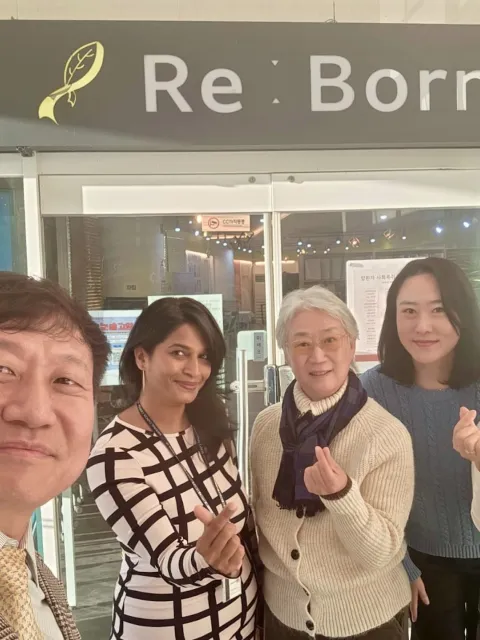There is an urgent need to invest in the early detection of pancreatic cancer
Pancreatic cancer is set to become the second-leading cause of cancer-related deaths in the US by 2030, but increased funding and innovative research offer hope for better early detection and treatment. Its low survival rate, which has not increased much in decades, means that it is essential to provide supportive care upon diagnosis.

HIGHLIGHTS
- Pancreatic cancer is projected to become the second-leading cause of cancer-related deaths in the US by 2030.
- The five-year survival rate for pancreatic cancer in the US is currently only 13%, with minimal improvement over the past 50 years.
- Early detection is challenging due to vague symptoms and the pancreas's deep location within the abdomen.
- Increased funding and innovative research are crucial to improving early detection and treatment options.
- Palliative care plays a vital role in supporting patients and their families, ensuring quality of life and emotional support.
Pancreatic cancer, one of the most lethal cancers, is set to be the second-leading cause of death due to cancer by 2030 in the US, surpassing colorectal cancer. It is also affecting a growing number of adults under the age of 50.
Despite its reputation as a nearly inevitable death sentence, Michelle Capobianco, CEO of Pancreatic Cancer North America (PCNA), a UICC member organisation, insists that this situation is not inevitable. Through increased funding and innovative research, and by drawing on lessons from successes in diagnosing and treating other cancers such as breast, cervical, prostate and colorectal cancers, significant strides can be made to improve early detection and treatment options.
In her interview with UICC, Michelle also touches upon the importance of supportive and palliative care, advances in detection and treatment on the horizon, the need for people-centred care, and PCNA’s Fire Fighter Cancer Project.
Pancreatic cancer is seen as one of the deadliest cancers. Is that true or just a misperception?
Unfortunately, the perception is currently rooted in reality. The five-year survival rate in the US for pancreatic cancer currently stands at 13% and it has barely improved over the last 50 years. In fact, we’ve only seen a slight increase in survival during that time, which is not something to celebrate. Compare that to survival rates in the US for breast, and prostate cancers, which are now at 90% or higher. Colorectal and cervical cancers have also seen significant progress in survival thanks to improvements in early detection.
The grim statistics for pancreatic cancer often create a sense of hopelessness, not only among the public but also within the medical community. I once overhead some general practitioners at a medical conference walking past a stand for pancreatic cancer saying: “That’s the one with no cure.” That shouldn’t be a reason to walk on by, but rather to stop and ask questions! We need to end this fatalism. This perception should not lead to apathy. On the contrary, it should inspire more funding, research, and support to change the trajectory of pancreatic cancer outcomes.
Why is pancreatic cancer so often fatal?
Pancreatic cancer is an aggressive disease and incredibly difficult to detect early. The symptoms are vague – things like mild back pain, nausea, or late-onset diabetes, which are often attributed to less serious conditions. By the time symptoms become severe enough to warrant investigation, the cancer is typically at an advanced stage, usually Stage 4, where treatment options are limited.
The location of the pancreas also contributes to the difficulty. It’s deep within the abdomen, behind the stomach, making it hard to detect through routine imaging techniques such as X-rays or ultrasounds. As a result, the disease often progresses unnoticed until it’s too late.
Adding to the challenge is the lack of widespread screening methods for pancreatic cancer. Unlike breast or cervical cancers, which have established early detection protocols, pancreatic cancer currently lacks a simple or reliable way to screen for the disease.
But ultimately, survival rates have remained stagnant due to limited funding and research compared to other cancers. There are promising developments in blood biomarkers and pre-diagnostic imaging, that would allow us to improve early detection and, consequently, survival rates. The key is increasing investment and focus to develop these tools. Otherwise, pancreatic cancer is projected to become the second leading cause of cancer-related deaths by 2030.
So you are saying that this situation is not inevitable. Pancreatic cancer is perhaps more difficult to diagnosis because it is aggressive and located deep in the body, but it could still be detected much more routinely at an earlier stage if we prioritise it the way we have other cancers?
Exactly. The real issue isn’t whether it’s possible to improve outcomes – it’s that we haven’t yet prioritised pancreatic cancer enough to make it happen. The challenges posed by pancreatic cancer – its location, its vague symptoms, and the lack of a reliable screening method – are significant, but they are not insurmountable.
If we look at the progress made with other cancers, such as breast and cervical cancer, it’s clear that prioritising funding and research makes all the difference.
For example, breast cancer was once in a similar position decades ago, but investments in mammography and widespread screening turned it into a cancer that is now detected early and treated successfully in many cases. We can do the same for pancreatic cancer.
Is this your primary mission at Pancreatic Cancer North America?
Yes, certainly one of the pillars. A pancreatic cancer diagnosis is generally and rightfully seen as a death sentence, and we want to change that narrative by pushing for the same prioritisation and funding that have transformed outcomes for other cancers. Our ultimate goal is to shift pancreatic cancer from a near-certain death sentence to a disease where survival is not only possible but expected.
At the same time, given the grim reality surrounding pancreatic cancer, palliative care is a vital part of our mission. For many patients, the diagnosis comes late, and treatment options are limited. Palliative care ensures these individuals can maintain quality of life, manage pain, and find emotional and psychosocial support. It also provides critical resources for families navigating this difficult journey.
You mentioned promising developments in biomarkers and pre-diagnostic imaging. Could you explain what these are and how it might change the diagnosis and treatment of pancreatic cancer?
Certainly! One of the most exciting areas of research we’re funding is a groundbreaking study at MD Anderson Cancer Center that combines blood biomarker analysis with pre-diagnostic imaging. By using artificial intelligence, researchers are analysing scans taken before and after individuals develop pancreatic cancer to identify early indicators of the disease. This could revolutionise early detection by providing the tools needed to spot the disease before it reaches advanced stages, when treatment options are more limited.
In the area of palliative care, there is also significant progress. We’re funding a study at Dana-Farber Cancer Institute exploring the use of psilocybin, a compound derived from certain mushrooms, for managing cancer-related pain and end-of-life distress. Unlike opioids, which can leave patients in a sedated haze, psilocybin allows individuals to remain lucid and connected to their families. This approach not only alleviates physical suffering but also helps patients find emotional peace during their final stages.
Could you perhaps provide more details about the importance of palliative care? What kind of support to you seek to provide people with pancreatic cancer and their families?
Palliative care is absolutely critical for people with pancreatic cancer, and it's essential to move past the common misconception that it is purely 'end-of-life’ care. We advocate for its integration at the time of diagnosis. Studies show that patients receiving palliative care live longer, comply better with treatment, and enjoy a higher quality of life.
People approach a diagnosis of pancreatic cancer in very different ways. Some want to fight aggressively, exploring every possible treatment and clinical trial. Others, knowing the odds, choose to focus on living life to the fullest for the time they have remaining. Palliative care allows us to honour those choices, providing a framework of support tailored to the unique needs of each individual.
This care isn’t just about managing pain, though that is a key element. It includes psychological support for both patients and their families, financial and legal advice to help put affairs in order, and resources for navigating difficult conversations about end-of-life planning, when appropriate. We also work to connect patients with holistic and alternative therapies, as well as practical resources such as peer support groups, which can provide comfort and understanding during such a challenging time.
We also focus on using compassionate language. Terms like ‘battle’ or ‘fight’ can alienate patients who choose not to pursue aggressive treatments. Instead, we aim to provide dignity, choice, and personalised care.
This certainly ties in with UICC’s new World Cancer Day 2025 campaign, United by Unique, which focuses on ‘People-centred care’. What does people-centred care mean for you, and how might that look like for people with pancreatic cancer?
People-centred care, for me, is about recognising that no two patients are the same. Especially with pancreatic cancer, where the prognosis is often devastating, people respond very differently. It also means recognising that every patient’s journey is unique.
This is especially important with a disease like pancreatic cancer, which affects not only the patient but also their family and support network. It’s vital to provide the right support – whether that’s palliative care from diagnosis, emotional or financial help, or guiding families through these difficult times. Ultimately, it’s about dignity, compassion, and meeting people where they are in their journey.
Can you share some examples of programmes or services that Pancreatic Cancer North America offers that focus on a people-centred approach to care?
One example is our initiative supporting firefighters, who are at a significantly higher risk of developing pancreatic cancer due to their frequent exposure to carcinogens, even from their own protective gear. Studies show that 80% of firefighter line-of-duty deaths are due to cancer, which is an astonishing statistic.
To address this, we created a mental health support programme specifically for firefighters and their families. This programme is unique because it’s tailored to the realities of firefighting – a profession where colleagues become a second family, and the physical and emotional toll is immense. The social workers in the programme are not only trained in oncology but have also been educated about the culture and challenges of firefighting, ensuring they truly understand the struggles these individuals face.
This isn’t just about the firefighters themselves; it extends to their families and the firehall communities, helping them process diagnoses and navigate the difficult journey ahead. At the same time, we’re advocating for greater recognition of firefighting as a carcinogenic profession to push for better protections, benefits, and awareness.
And what are you doing to mark World Cancer Day on 4 February 2025?
For World Cancer Day, we’re focusing on amplifying the voices of those impacted by pancreatic cancer. We’re sharing stories from patients, families, and caregivers to highlight the unique challenges and resilience within this community. These stories tie into the UICC’s ‘People-centred care’ theme, showcasing how every person’s journey is different and the importance of tailoring care to their needs.
Additionally, we’re using the day to draw attention to our firefighter initiative, raising awareness of their heightened cancer risks and the support they need. It’s also an opportunity to push forward our strategic goals, including advocating for more funding and awareness for pancreatic cancer research and care.
Last update
Wednesday 15 January 2025
